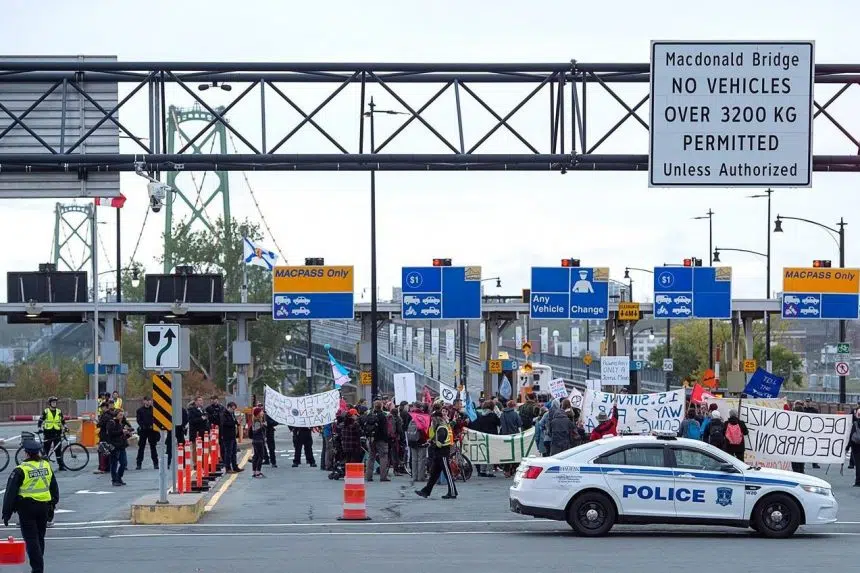Protesters shut down a handful of bridges across Canada today as part of a global effort to push for more urgent action on climate change.
Activists with a group dubbed Extinction Rebellion blocked traffic on bridges in Halifax, Toronto and Edmonton, with similar protests planned for Montreal and Vancouver later in the day.
At Edmonton’s Walterdale Bridge, video shows a handful of protesters being angrily confronted by one man urging them to allow one lane of traffic through so drivers could make their way to work.
The scene was more peaceful at the bridge spanning Toronto’s Bloor Viaduct, where police officers were on scene monitoring the protest, but said no arrests were expected.
Halifax police Const. John MacLeod says less than 100 protesters had gathered at the Angus L. Macdonald Bridge linking the city with nearby Dartmouth, prompting officers to close the area to all traffic.
The protesters marched down to the bridge toll plaza waving flags and signs before congregating in an area near the tolls as police cruisers blocked traffic on routes leading to the bridge.
Members of the group usually sit or lie down in front of traffic until they are arrested and taken away by police officers. Such a scene played out in cities around the world throughout the day.
In Berlin, around 1,000 people gathered before dawn to block the Grosser Stern, a traffic circle in the middle of the German capital’s Tiergarten park dominated by the landmark Victory Column.
By lunchtime, another 300 people blocked Berlin’s central Potsdamer Platz, placing couches, tables, chairs and flowerpots on the road. Police said the protests were peaceful.
Demonstrators playing steel drums marched through central London as they kicked off two weeks of activities designed to disrupt the city.
London police said some 135 climate activists had been arrested. Extinction Rebellion said protesters from the XR Peace group were arrested as they blocked Victoria Embankment, outside the Ministry of Defence.
Among those arrested was 81-year-old Sarah Lasenby, a retired social worker from Oxford.
“It is imperative the government should take serious actions and put pressure on other states and global powers to radically reduce the use of fossil fuels,” she said.
In Amsterdam, hundreds of demonstrators blocked a major road outside the Rijksmuseum, one of the city’s most popular tourist attractions, and set up tents. The protest went ahead despite a city ban on activists gathering on the road. The protesters ignored police calls for them to move to a nearby square.
In Spain, a few dozen activists briefly chained themselves to each other and to an elevated road over a major artery in Madrid, snarling traffic during the morning rush hour. Police said 33 activists were taken to their premises and three were arrested for resisting orders by anti-riot officers.
A few hundred other protesters camped out in 40 tents at the gates of Spain’s Ministry of Ecological Transition.
Founded in Britain last year, Extinction Rebellion, also known as XR, now has chapters in some 50 countries. The group said the protests Monday were taking place in 60 cities worldwide.
Merkel’s chief of staff, Helge Braun, criticized its tactics.
“We all share an interest in climate protection, and the Paris climate targets are our standard in this,” he told ZDF television. “If you demonstrate against or for that, that is OK. But if you announce dangerous interventions in road traffic or things like this, of course that is just not on.”
– With files from Keith Doucette in Halifax and The Associated Press
Michelle McQuigge, The Canadian Press







